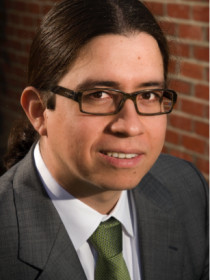Connect with Juan
About Juan
Juan Moreno-Cruz’s focus is on climate change economics, where he deals with global issues such as international environmental agreements and energy transitions, and also local issues such as the spatial distribution of economic activity. His research has been published in Science, Nature Geosciences, Proceedings of the National Academy of Sciences, Environmental Research Letters, Climatic Change, Energy Policy, Environmental and Resource Economics, and Resource and Energy Economics.
Contributions
In the News
Publications
Explains how some climate change impacts rise fast with little warming, and then taper off. Argues that to avoid diminishing incentives to reduce emissions and inadvertently slipping into a lower-welfare world, mitigation policy needs to be ambitious early on.
Summarizes the state of the literature on economic analysis of geoengineering and climate policy.
Uses a method to evaluate fluctuating pollutant formation from source emissions, which is integrated within an electricity production model. Shows how to reduce air pollutants and health impacts by shifting production among plants during a select number of hourly periods.
Examines the economic issues introduced when geoengineering becomes available in a standard model where strategic interaction leads to suboptimal mitigation. Finds that specific strategic effects create greater incentives for free-riding on mitigation, but with asymmetric countries, the prospect of geoengineering can induce inefficiently high levels of mitigation.
Shows that regional differences in climate outcomes create strategic incentives to form coalitions that are as small as possible, while still powerful enough to deploy solar geoengineering.
Presents a simple model to account for the potential effectiveness of solar radiation management (SRM) in compensating for anthropogenic climate change. Provides a parsimonious way to account for regional inequality in the assessment of SRM effectiveness and allows policy and decision makers to examine the linear climate response to different SRM configurations.
